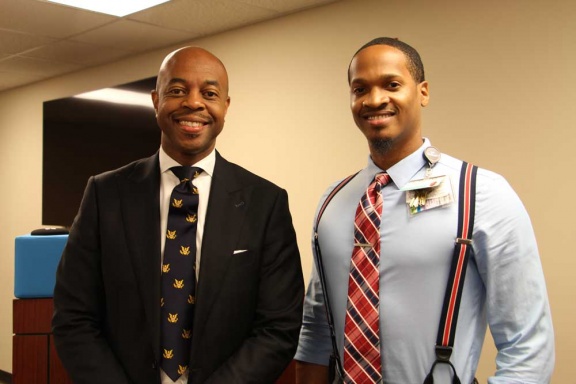NASHVILLE, Tenn. For the past two years, Faith & Health Collaborative has focused on supporting local faith leaders with Positive Youth Development programming, with the goal of improving the health of the greater community.
Perhaps more than any other community of youth, adolescent black males face obstacles of racial discrimination, community violence and, at times, hopelessness. Although, information about these obstacles and the negative impact they have is well documented, there is a continuous struggle to implement adequate measures to combat them.
On October 10, 2019, Walter Wilson, Jr. MD, MHA and Rev. Representative Harold Love, Jr., PhD met with faith leaders and representatives from youth-serving community-based organizations for a roundtable discussion spotlighting the ongoing issue.
Peer relationships
“In peer relationships, what we’re looking for is praise,” Wilson stated early in the discussion. “You’re trying to avoid disapproval, and you’re trying to satisfy expectations of where that relationship is.”
Dr. Wilson is a second-year Child and Adolescent Psychiatry Fellow at Vanderbilt University Medical Center. His current work in Nashville focuses on the intersection of mental health, psychiatric training and spirituality of African American boys, adolescents and men.
He then noted, being an African-American man himself, “All of this is intuitive. My mother told me when I was young, ‘If you’re not around positive people, you’re not going to do positive things.’”
Frustration
Following Dr. Wilson’s talk, African-American boys and Adolescents: Fostering Evidence-Based Positive Youth Development, Rep. Love briefly addressed the needs of local youth in the Nashville community. The frustration, Dr. Wilson, and community members said, was that the obstacles young African-American men face and how to overcome them are known, but virtually nothing is being done to alleviate them.
“We know all this, and we’re still not implementing it the right way,” Dr. Wilson said. “That’s where my frustration comes from.”
Rep. Love agreed and offered one possible explanation: “In the 1950s, 60s and 70s, the struggle was not to foster positive African American development. The struggle was to get civil rights legislation passed.”
In those days, according to Love, the black church was concerned primarily with the survival of black people.
“The information has been there,” he said, “but the information was not at the forefront,” Rep. Love challenged voters in the room to challenge elected officials with the question, “What part of your political agenda seeks to support positive youth development in our community, and particularly for our young African-American men.”
Rep. Love represents Tennessee’s 58th District in the state House of Representatives and serves as Pastor of Lee Chapel AME Church in Nashville.
Future Directions
Many in attendance noted that Nashville has had success in past programs that focus on African-American youth development, but those programs lacked support and funding.
Rep. Love explained the importance of community members reaching out to local politicians when the time comes for budgets to be made. “A budget is a moral document” stated Rep. Love, expanding to say “We fund what we believe in.” Love stressed the idea that it is the responsibility of the community to let politicians know that we believe in African-American youth, and their futures are important causes that need funding.
As the old saying goes, “It takes a village to raise a child.” Dr. Wilson closed the discussion in emphasizing the importance that parents, mentors, and faith leaders have in creating a positive environment for youth. He reiterated the need for open discussions with youth on the topics that impact them. The youth in attendance left equipped not only with knowledge on their development, but also a host of new mentors to expand their village.
About the Meharry-Vanderbilt Alliance
Founded in 1999, the Alliance bridges the institutions of Meharry Medical College and Vanderbilt University Medical Center. Its mission is to enrich learning and advance clinical research in three primary areas -- community engagement, interprofessional education and research -- by developing and supporting mutually beneficial partnerships between Meharry Medical College, Vanderbilt University Medical Center and the communities they serve. Through community engagement, the Alliance serves a large community of stakeholders including surrounding universities and colleges, community organizations, faith-based outlets and community health centers. Its interprofessional education enhances students' interdisciplinary understanding and improves patient outcomes through integrated care. The research conducted provides access to experienced grant writers and materials supporting the grant application process and facilitates grant-writing workshops.
